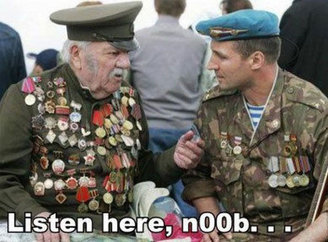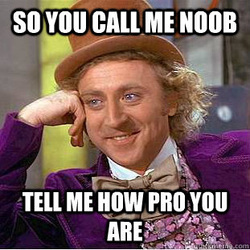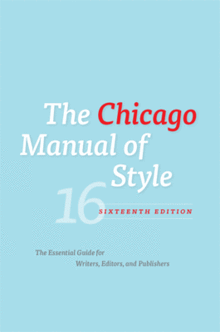It's Okay to be a NOOB
 There are about a hundred things I should be doing right now, but I'm not. Nope. Instead, I'm here, writing this post. Why? Because, if I don't my mouth, (or fingers), are going to take off ahead of my brain, just before that brain explodes. There are a few things I've witnessed this week that are making me a little crazier than usual.
There are about a hundred things I should be doing right now, but I'm not. Nope. Instead, I'm here, writing this post. Why? Because, if I don't my mouth, (or fingers), are going to take off ahead of my brain, just before that brain explodes. There are a few things I've witnessed this week that are making me a little crazier than usual.I've done a few interviews over the past two years. Some when I was an aspiring author, more after I became an author. Nearly every one included some version of this question: "What is your advice to aspiring authors?" In most of those interviews, I answered with something about never giving up or letting anyone drag you down. I still believe in that, but a couple of years of watching people make a ton of gaffs, and making more than a few of my own, have given me a whole menu of things I could add to that answer.
 I'm the first person who'll tell you I'm no expert at the author game. I'm not on any bestseller lists, and nobody's lining up to get my signature, listen to me read, or hear me speak. What I do have going for me, I hope, is an open mind, a willingness to learn, and a keen sense of observation. So, if you'd like to hear my take on things, strap in, grab your holy-crap handles, and pay attention. I'm going to tell you what I think an aspiring author needs to know.
I'm the first person who'll tell you I'm no expert at the author game. I'm not on any bestseller lists, and nobody's lining up to get my signature, listen to me read, or hear me speak. What I do have going for me, I hope, is an open mind, a willingness to learn, and a keen sense of observation. So, if you'd like to hear my take on things, strap in, grab your holy-crap handles, and pay attention. I'm going to tell you what I think an aspiring author needs to know.It's okay to be new, just don't be ignorant.
And I don't just mean ignorant as in rude, though that should be an obvious no-no. I mean don't be stupid. Don't think you can just write, self-edit, slap together your own cover, hit publish on some site and become the next big thing in Indie Publishing. It's not going to happen. If you jump into publishing on a whim, with no idea of what you are doing, you're only going to become one more wretched bit of flotsam in the great sea of online books.
Don't be a twat-waffle.
One of the worst pieces of advice I ever got was, "if you act like you know what you're doing, you'll get more respect." Bullshit! If you act like you know what you're doing, and you don't, all you'll get is a reputation for being an twat-waffle. Seriously, who doesn't get annoyed at the person who tries to bullshit everyone around them? If you're going to learn anything about becoming an author, you need to admit you don't know shit about becoming an author, and then do something about it.
Find a writers' group and join it.
Find five or six. Creep the threads. Read other people's posts. You don't have to jump in there with all your newbie enthusiasm right away or anything. Watch the group interact. Read the advice they give each other. Learn some things. When you feel comfortable you can jump in and ask some questions, but the first thing you do is tell them that you're new at this. You'll get more answers and a better reception. Trust me.
Find a mentor.
That was better advice, but not every author out there is going to have the time, energy or, (let's be honest), inclination to hold your hand all the way to publication. In fact, I'm pretty sure it's technically impossible for a single author to know every secret of becoming a successful author. Get several mentors. You don't even have to ask them to be your mentors. If you pay attention to enough authors who post about writing, editing and promoting on their social networks and blogs, you'll learn so much more. You'll also avoid the possibility that your single mentor might turn out to be a twat-waffle in disguise.
Get some critics.
No, I don't mean a couple of friends who'll read your stuff and gush about how brilliant you are, (though having a few of those can keep you from giving up, sometimes). I mean wild-eyed, ravenous readers who get migraines from a misplaced comma. I mean someone who will take a red pen to your work with an evil cackle of joy, and tell you when something is crap. Again, get a few. What one person doesn't like, another might think is absolute brilliance. You just want to make sure they'll tell it to you straight. Go ahead and have a quiet tantrum about what they said. Cry a little if it helps. Just DO NOT post about it on a public profile. When you're done, suck it up and get to work on fixing it.
 Buy this book:
Buy this book: http://www.amazon.ca/Chicago-Manual-Style-16th-Edition/dp/0226104206
It's the one most of the industry relies on for editing. Use it when you self-edit. Don't trust that critique partner to know it. Not everyone is an editor. You won't be either, but you will have some clue about how to fix what that critique partner pointed out.
I am a terrible self-editor, and doing it makes my teeth itch. But, I know I have to make my submissions as clean as possible. So I have several people proof-read for me, and then I pay an editor to fix what they may have missed.
Hire an editor.
This is important. Even editors hire editors for their writing. That's how important it is. Not everyone can afford an editor, I know, but if you're serious about becoming an author, an editor is a key factor in your success and an investment you need to make. It doesn't matter if you're self-publishing or submitting to a publisher. It doesn't! Either way, you need that debut to be in the best possible shape before it goes anywhere.
Pay someone to make your cover.
PLEASE! If you write a brilliant book, and slap a cover on it that looks like someone Photoshopped vomit onto paper, and then coloured it in with Sharpies, you will fail. If you take a standard stock picture and slap some text on it, you will fail. People will judge your book by its cover. Unless you are a graphic artist, you don't know covers. Believe me. I did graphic design for five years, for newspapers and other print mediums. I hire a cover artist. Why? Because I know ads, but I don't know shit about book covers. I tried to make my own. They were awful. If you aren't going with a publisher, (who should be providing you with a cover), hire a cover artist.
This is a big one, ready? Listen up now: NEVER RESPOND TO LOW-STAR REVIEWS.
Period. Unless you know how to thank a person for giving you a one-star review without a backhanded, "Thanks for your opinion", just don't. I don't care if they never read the book. I don't care if their review wasn't even about the book. Even if they said you have herpes, crooked teeth, a bad weave, and a twisted relationship with your brother-in-law's housecat, just don't do it! Reviewers like that are asshats. It's pretty easy to see that asshattery is afoot when a single sentence review, with a single star, shows up on your book. Responding to it will only make you look like a petulant diva who doesn't give their readers credit for having half of a brain cell. I'm not saying all one-star reviews are done by asshats, either. It could simply be that someone *gasp* didn't like your book! Not everyone is going to love what you write. I'm sure that woman who wrote that vampire series is too busy counting her millions to care about reviews, at all. Don't question the reviewer, don't comment on the review, and NEVER call the reviewer out. I saw this happen just this week, and it escalated into a major drama no one needed.
Note: I ignored my own advice on this one. Yup. I sure did. I had a reviewer who gave me low-star review based on shoddy editing and I emailed that reviewer privately. Why? To thank them for trying, and to offer them the re-edited re-release of the book, (long story, feel free to ask me about it, sometime), if they wanted to give it another chance. They turned the offer down, but they did commend me on my professional handling of the situation. Did they remove the review? No. Should they? Hell, no! Reviews are the opinion of the reader. Everyone is entitled to their opinion, and no one can say that opinion is wrong.
Do NOT succumb to the mob mentality.
I saw this happen this week, too. If someone posts about a pirate site, check it out and make sure it's actually a pirate site, and not just one that links to Amazon, or some other legitimate sale site. If someone posts about an author being bullied, don't jump into the fray with blazing swords and flying, verbal fists. Check it out for yourself. Make sure that you've got all of the information, before you join the battle or choose a side.
I had this fantastic history teacher in my first high-school. His name was Mr. Winter. I'll never forget one of the things I learned in his class. It was about perspective. I don't think he told us this outright. If I remember correctly, he set us on the path to figuring it out for ourselves. It was a lesson on propaganda. Until that day, in my seventeenth year, it had never once occurred to me that the German soldiers in WWII thought we were the aggressors and oppressors! It's what they were told by those they trusted.
With social media, we've gained a lot of perspective on events around the world, but we've lost a lot of perspective as well. I've mourned the demise of journalistic integrity and detachment for a few years, now. When I was younger I wanted to be a journalist. Now I can't even bring myself to check the news most days. Not because I don't want to be informed, but because the reporting is so tainted by the perspectives of the media, I don't know what to believe any more.
When someone we trusts tells us about an injustice, we tend to choose the same side as our friends, without seeking further information. Just remember, there are three sides to every story, the only way to get to the third, the truth, is to investigate both of the others.
That's it from me, for now. Hopefully someone found this helpful or, at the very least, entertaining. Ciao for now!
~Sin
Published on August 23, 2013 16:07
No comments have been added yet.



